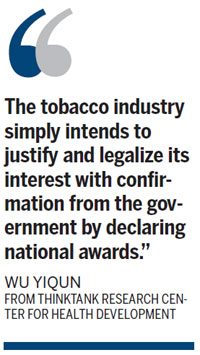Ministry blasts tobacco award bid
By Zheng Xin (China Daily) Updated: 2012-04-13 10:58
|
 |
The Ministry of Health has added its voice to a chorus of opposition to a tobacco research project being nominated for a prestigious national prize.
China National Tobacco, which doubles as a corporation and government bureau, says its scientists have reduced the harm of cigarettes and has put forward their research for the 2012 National Award for Science and Technology.
The inclusion of the project on a long list published by the Ministry of Science and Technology has led to harsh protests.
"Any attempt to reduce the hazards of smoking through so-called technological and scientific methods is just irresponsible," said Health Ministry spokesman Song Shuli on Thursday, adding that the only way to be safe from the harm of smoking is to not smoke.
Fu Wei, deputy director of maternity, childcare and community health for the ministry, added: "Any research that intends to boost sales and consumption of tobacco products is against the spirit of the World Health Organization Framework Convention on Tobacco Control. Scientific research has already proved the risks smoking poses to health."
Other groups that objected include the WHO, Chinese Centers for Disease Control and Prevention, Chinese Preventive Medicine Association, Chinese Association on Tobacco Control, Chinese Anti-Cancer Association and China Elder Healthcare Association.
Michael O'Leary of the WHO told Xinhua News Agency that there is "no safe level of tobacco consumption" and warned: "Misleading information can be very harmful to public health."
Thirty high-profile scholars, including Zhong Nanshan and Qin Boyi of the Chinese Academy of Engineering, have signed a letter appealing to the government to fulfill its social responsibility and give public health priority.
China National Tobacco, which is also the State Tobacco Monopoly Administration, says its research project improves the flavor of cigarettes, with about 70 kinds of fragrant and sweet additives, and reduces their harm. The study was recommended for the national prize by the State Tobacco Monopoly Administration.
All 800 or so applications on the ministry's list are open to public comment until early May.
The Ministry of Science and Technology, however, countered critics who question the scientific legitimacy of the China National Tobacco project.
"Looking at the research as progress in science and technology is reasonable, considering its potential to reduce the harm and hazards of smoking," ministry spokesman Wu Yuanbin said on Thursday.
Previous awards
The China National Tobacco research project has already received several awards, including five provincial awards for technology progress, and has been granted 42 national invention patents.
In addition, other tobacco-related research projects have applied for national awards. Seven such projects have received the National Award for Science and Technology since 2002, according to a magazine affiliated with the State Tobacco Monopoly Administration.
Only two of the winning projects involved reducing harmful substances in cigarettes and mitigating tobacco's health hazards, while others focused on matters such as high-density production technology.
The National Award for Science and Technology is given to Chinese citizens and organizations that have made technological and scientific contributions.
"The tobacco industry simply intends to justify and legalize its interest with confirmation from the government by declaring national awards," said Wu Yiqun, an anti-tobacco activist from the ThinkTank Research Center for Health Development, a non-government organization committed to smoking control. "This is a burning shame."
According to Wu, to award the tobacco research project can only boost cigarette sales, which violates the WHO Framework Convention and China's regulations that forbid conducting any scientific research that is potentially hazardous to public health.
Zang Yingnian, former tobacco control consultant at the WHO, told China Daily that the tobacco industry has long been an issue in China.
"The State Tobacco Monopoly Administration is both a government body and a company, and that makes it inevitable one of its functions is the pursuit of profit," he said. "How can you make sure the director of the administration, who is also a company manager, isn't focused on (financial) interests?"
Zang said it is necessary to set up funding by channeling some of the tobacco taxes toward reducing smoking. "It's important that the profit-making tobacco industries fulfill their social responsibility," Zang said.
China collected 753 billion yuan ($119 billion) in tobacco industry taxes last year, 22.5 percent more than in 2010, according to the National Statistics Bureau.
Wang Qingyun contributed to this story.
zhengxin@chinadaily.com.cn
- Sports consumption a big winner
- Jilin Grain gets $1.5 billion in bid to restructure
- Alphabet tests drones as US considers new rules
- Sinopec to sell 50% of its gas pipeline
- E-shopper experience to go high-tech with Buy+
- Baidu, Xiaomi bullish on India
- LeEco and Netflix may share content
- 325 million lured by live streaming apps


















